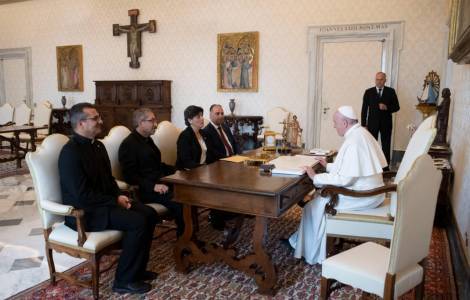Beirut – The project “KAIROS Middle East: towards a global Church pact” takes shape, designed by the Middle East Council of Churches, (MECC) as a tool for global reflection on the condition of Churches and Christian communities in the current Middle Eastern context. From 6 to 8 December, at the initiative of the MECC Department of Theology and Ecumenical Issues, 25 experts in theology and geopolitics from Iraq, Egypt, Syria, Palestine, Lebanon, Cyprus and Jordan gathered to draw up the guidelines of the path, which will be presented in its complete form and its possible developments at the next General Assembly of MECC, scheduled for September 2020. Experts and consultants gathered at the Bethania center in Harissa, and coordinated by Father Gabi Hashem (director of the department of theology and ecumenical affairs of MECC), drafted a working document aimed at expressing a theological and spiritual approach to the situations and events that Christians in the Middle East are facing, focusing the attention on the contribution that ecclesial realities are called to offer in public space.
During the work, Professor Souraya Bechealany, Secretary General of MECC, reiterated the importance and intent of the “path” undertaken to foster realistic and at the same time prophetic discernment about the condition and role of Christians in the region. Father Gabi Hashem instead insisted on the need to start from the predilection for the poor to guide ecclesial practices also in the Middle East.
On September 2nd, a MECC delegation led by Professor Souraya Bechealany had a meeting with Pope Francis (see photo), in the Apostolic Palace of the Vatican City. On that occasion (see Fides 3/9/2019), the project “KAIROS Middle East: towards a global Church pact” was also presented to the Bishop of Rome. On that occasion, the Pope blessed MECC and its initiatives, and had also invited the members of the Council to focus their choices and their action around the experience of synodality, to be recognized as an expression of the dynamics moved and nurtured in the ecclesial body from the work of the Holy Spirit.
The Middle East Council of Churches, founded in 1974 in Nicosia and currently based in Beirut, aims to facilitate the convergence of Middle Eastern Christian communities on topics of common interest and to favor the overcoming of contrasts of a confessional nature.
Professor Souraya Bechealany, a Maronite Christian, teaches theology at the Université Saint-Joseph de Beyrouth. Souraya was elected general secretary of MECC in January 2018, and together with her collaborators she undertook a process of restructuring the departments of the ecclesial body.






